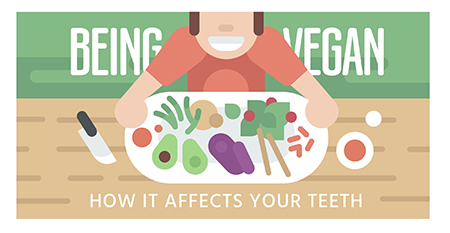
There is no doubt that a plant-based diet is optimal for health. Omnivores and vegans alike benefit from the nutrients present in plants. But how does what we eat relate to our dental health? Is a vegan diet better or worse for dental health? Well, it depends. There are some concerns for oral health when one consumes a vegan diet.

Here are the main ones:
Vitamin B12 deficiency:
A vitamin B12 deficiency can lead to gum disease and tooth loss. Vegans should supplement with adequate B12, as plants do not provide this important nutrient.
Lack of remineralizing foods:
Remineralization occurs when essential minerals that support hardened, healthy enamel are resupplied to the tooth after loss caused by acid erosion. The best remineralizing foods contain phosphorus or calcium. Phosphorus is found in high amounts in cheese, meat, and milk. Vegans can supplement with beans, grains, seeds and nuts. Hummus is a great choice as well. Chickpeas contain phosphorus and tahini contains both calcium and phosphorus. Calcium can be found in nuts and leafy greens.
Lack of important amino acids:
One example is the amino acid arginine, which is found in meat, poultry, fish, and dairy. Arginine helps prevent cavities and gum disease by breaking down dental plaque. While arginine is found in higher quantities in meat, vegan sources of arginine include pumpkin seeds, peanuts, soybeans, lentils, and chickpeas.
Calcium concerns:
Your body needs enough calcium to support healthy teeth and gums. Vegans need to supplement their diet with plenty of plant sources that contain calcium (almonds, leafy greens, beans, etc.) as well as fortified vegan milks (almond, soy, rice, etc.). Calcium supplements can also be taken.
Frequent snacking:
Continual snacking provides an environment for bacteria to thrive and attack your tooth’s enamel. This leads to a greater chance of decay. Vegans may be more prone to frequent snacking in an effort to meet their body’s need for energy. You may find eating meals with a higher fat content helps you stay full for longer periods of time.
More sugars/starches in the diet:
It can be easy as a vegan to eat a diet based on sweet/starchy foods like fruits and grains (cereal, bread, pasta, crackers, rice, etc.). But the bacteria in your mouth that cause tooth decay thrive on sugar. Carbohydrates in all forms are sugar. Make sure to round out your diet with non-sugary foods, such as tofu, nuts, seeds, and plenty of vegetables.
Hard, crunchy foods:
A diet with lots of raw vegetables and nuts is healthy but chewing on all those hard foods can lead to wear and possibly tooth fracture. Slow down while eating grab-and-go nut bars to avoid biting down too hard into a nut.
If you’re a vegan, you already know you have to be mindful of certain key nutrients that you may need to focus on or supplement in your diet. Keep this list in mind to ensure your dental health is also in tip-top shape!



